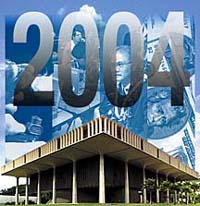
Universal care proposals
inch forward in House
Hawaii inched closer to a system of universal health care under a pair of bills advanced by House lawmakers on Tuesday.
The proposals -- one to provide health insurance for part-time workers and the other to establish a state agency to come up with a universal care system -- still face hearings before two House committees, approval by the full chamber and approval from the Senate.
Star-Bulletin Legislature Database
Star-Bulletin Legislature Guide
(PDF, 2.4 MB)
State Legislature: Bills
& Hawaii Revised Statutes
Similar legislation to establish a universal health care system was shelved near the end of last year's session after lawmakers were unable to reach a consensus on what form the measure should take.
The proposal to provide health care for part-time workers was introduced by House Labor Chairman Marcus Oshiro, D-Wahiawa-Poamoho.
It would create a state agency of volunteer care providers and insurance companies that would offer medical coverage for part-time workers not covered by the state's landmark Prepaid Health Care Act of 1974.
Oshiro said he expects the proposal could provide health coverage for up to 58,000 uninsured residents -- about half the state's estimated population of 120,000 uninsured.
"I think the ultimate goal is to have universal coverage for all people," he said. "A half step is to have universal coverage for all working people, so that's where we're going right now."
The proposal is patterned after a program in Maine that was passed last year. The Dirigo Health program is expected to sign its first enrollees this summer.
The House Labor and Health committees advanced the bill with minor technical amendments. The committees also advanced a universal care proposal sponsored by Health Chairman Dennis Arakaki, D-Alewa Heights-Kalihi.
That bill would establish the State Health Authority to bring together all state funded health programs to determine how best to serve Hawaii's uninsured population. It also would be tasked with coming up with a funding mechanism for carrying out its mission.
A similar House proposal died in committee last year. It proposed to create an agency to collect payments from all sources -- private employers, Medicaid, public employee plans, the state's QUEST plan and the medical parts of homeowners, automobile and workers compensation plans -- into a single $5 billion pool to buy medical coverage for everyone.
The bills advanced Tuesday now go to the House committees on Commerce and Consumer Protection Committee and Finance. If ultimately approved by the full chamber, the bills then would face committee hearings and approval by the Senate.
